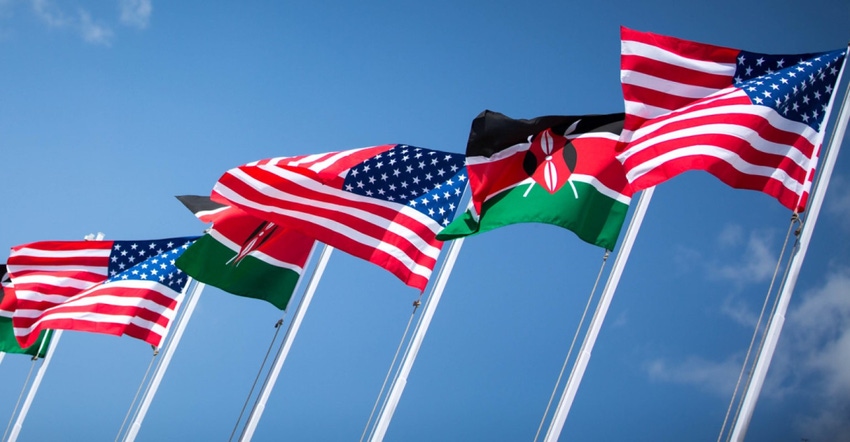Trump sets sights on Kenya trade deal
USTR indicates that it will formally notify Congress of intent to negotiate trade agreement with Kenya.

President Donald Trump announced that the U.S. intends to initiate trade agreement negotiations with the Republic of Kenya following a meeting at the White House with Kenya President Uhuru Kenyatta.
The U.S. Trade Representative (USTR) announced its intention to negotiate a free trade agreement with this country, which represents a growing economy within Africa, and wants to set the tone for other East African nations interested in expanding their global footprint.
“Kenya is a recognized leader across the continent, an important strategic partner of the United States, and there is enormous potential for us to deepen our economic and commercial ties,” USTR Ambassador Robert Lighthizer said. “Under President Trump’s leadership, we look forward to negotiating and concluding a comprehensive, high-standard agreement with Kenya that can serve as a model for additional agreements across Africa."
At the direction of Trump, Lighthizer will officially notify Congress of the Trump Administration’s intention to start negotiations following the consultations with Congress that are required by the Bipartisan Congressional Trade Priorities & Accountability Act of 2015 — often referred to as trade promotion authority (TPA). USTR will also publish notices in the Federal Register requesting public input on the direction, focus and content of the trade negotiations. In accordance with TPA, USTR will publish objectives for the negotiations at least 30 days before trade negotiations begin.
The announcement came while the U.S.-Kenya Trade & Investment Working Group held its third meeting in Washington the week ending Feb. 7. The working group, established by Trump and Kenyatta in August 2018, is laying the groundwork for a stronger bilateral trade relationship.
Other outcomes of the third meeting of the Trade & Investment Working Group include the following:
Adoption of a phytosanitary protocol by Kenya that allows American wheat growers in Washington state, Oregon and Idaho access to Kenya’s $470 million wheat market for the first time in more than a decade.
Development of a plan to provide technical assistance and trade capacity building with the aim of maximizing Kenya’s utilization of trade benefits under the African Growth & Opportunity Act (AGOA).
A U.S.-Kenya Small & Medium Enterprise (SME) Roundtable to identify and discuss ways to strengthen commercial cooperation in the SME sector and discuss the benefits to SMEs on both sides of reducing barriers and increasing trade between the U.S. and Kenya.
Site visit to the Howard University School of Business’s Small Business Development Center to exchange information on U.S. best practices to support the SME sector, which is a priority for Kenyatta.
Annual exports of wheat to Kenya from other regions in the U.S. from January to November 2019 (latest data available) were $27 million. Kenya’s demand for wheat is expected to substantially increase in the coming years due, in part, to an expanding foodservice sector.
Trade between the two countries stands at about $1 billion a year. More than 70% ($466 million in 2018) of Kenya’s exports to the U.S. entered under AGOA. With an increase in people comes an increase in demand for food, and Kenya's population is growing rapidly, with more than 50 million people in 2019, compared to less than 9 million in 1960.
Kenya is a large consumer of rice, both producing it domestically and importing more than 500,000 tons, on average, with a high of nearly 625,000 tons in 2017. Current imports are primarily long-grain rice coming from Pakistan, Thailand and India, with trace amounts from the U.S. in years past. U.S.-grown rice shipped to Kenya currently faces a 35% tariff, which is, of course, an obstacle to entry. Kenya's products currently enter the U.S. duty free through AGOA requirements, which are set to expire in 2025.
USTR indicated that it will be formally notifying Congress of its intent to negotiate a trade agreement, followed by a call for public input. "We look forward to negotiating and concluding a comprehensive, high-standard agreement with Kenya that can serve as a model for additional agreements across Africa," Lighthizer said.
USA Rice president and chief executive officer Betsy Ward said, "USA Rice will be taking a deeper look into market potential for sales of U.S. rice to Kenya and surrounding African nations as populations and demand for rice in the region grow. We appreciate the Administration's robust approach to trade this year, and eliminating the duty U.S. rice faces in Kenya would go a long way to building a new market for U.S. rice."
About the Author(s)
You May Also Like





